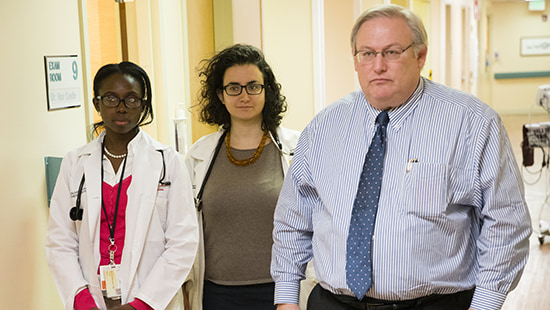Parkinson's Disease Symptoms

Parkinson’s disease usually starts by causing motor, or movement, symptoms.
Some people will notice a tremor (shaking) on one side of the body, usually in the hand when it is at rest, such as in a lap.
Slowness and stiffness are also common symptoms in Parkinson’s disease.
In some people with Parkinson’s disease, the symptoms will be worse on one side of the body.
People with Parkinson’s disease and their family members may notice that the voice is softer (more quiet) and/or that the person with Parkinson’s disease has less facial expression. Everyone with Parkinson’s disease is different, though, and one person may or may not have all the different symptoms.
As Parkinson’s disease gradually gets worse over time, people with Parkinson’s disease will have other symptoms, as well. People often have trouble with walking and balance after they have had Parkinson’s disease for years. When the Parkinson’s disease gets worse, someone can also have a symptom called “freezing of gait,” where he or she feels like his feet are stuck or frozen to the floor.
Patients with Parkinson’s disease can also have non-motor, or non-movement, symptoms. For example, constipation is common. Some patients may also have urinary problems. Anxiety and depression occur in over half of people with Parkinson’s disease. Usually later in the disease, difficulties with memory and thinking are common. Both movement and non-movement symptoms of Parkinson’s disease progress slowly over time.
Long-term Effects
With time, a person's degree of motor disability does tend to increase. After about 10 to 15 years of illness, the symptoms will often begin to interfere with daily activities.
Advanced Parkinson's Disease
As the disease progresses over time, symptoms related to Parkinson's disease typically get worse, and new problems emerge. Patients continue to receive significant benefit from their anti-Parkinson's medication, but the benefit does not last as long any more ("wearing off"), so that patients typically take their medications more frequently. Many patients also experience involuntary movements, making them look "fidgety", during times when the medication otherwise works the best (so-called levodopa-induced dyskinesias). It is important to emphasize that these movements typically do not bother the patient very much.
Other problems that may occur as Parkinson's disease progresses include the following:
- Problems with gait and balance, including falls
- Difficulty communicating (speech impairment)
- Swallowing difficulty
- Weight loss
- Cognitive impairment (thinking, memory) and behavioral problems
- Autonomic problems, e.g. difficulty with urination, sexual dysfunction, light-headedness
Some of these problems are more difficult to treat with medications than others, but an experienced doctor (ideally a movement disorder-trained neurologist) will still be able to provide guidance and support for a patient and his/her loved ones, even in advanced stages of Parkinson's disease.
